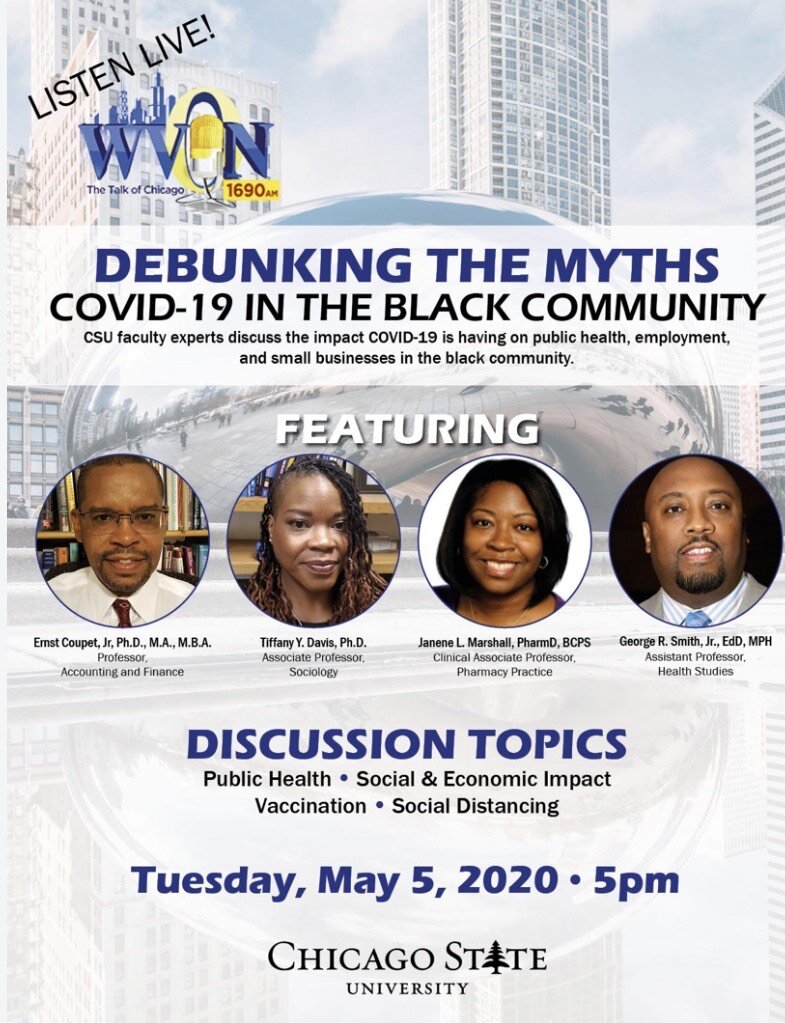CSU faculty experts discuss COVID-19 live on WVON radio station in Chicago
The digital announcement shared by Chicago State University on Linkedin.
On May 5, 2020, WVON 1690AM radio held a live discussion with Chicago State University (CSU) faculty experts called “Debunking the Myths COVID-19 in the Black Communities”. The conversation focused on the impact of COVID-19 on public health, employment and small business in black communities.
WVON radio host Matt McGill led the discussion with the first faculty expert to speak being Dr.Tiffany Y. Davis, an associate professor of sociology. Davis shared her thoughts about the social impact of COVID-19 from a sociological angle. She is interested in understanding and comprehending how the black community is not only experiencing COVID-19 but how they are reacting to it.
“I think it's important that when we look at what's going on that we do so in a way in which we're conceptualizing everything in a social and historical embeddedness in a way we understand what got us here today,” Davis said.
She also provided an example of a previous response. “Simply being black by virtue of the way in which race is structured in our society,” Davis said. “You absolutely will be predisposed to inadequate health care, lack of access to quality education, quality housing.”
Davis went more in-depth about the division within the black community. “In many ways the black community has been quarantined socially, politically, geographically in the city of Chicago in a lot of major cities in the nation prior to this actual quarantine around COVID-19,” she said.
Davis says she hopes to encourage people to think carefully about the long process that has happened historically that has gotten the black community in Chicago in the position they are in today with the impact of COVID-19.
The next faculty expert to speak was Janene L. Marshall, a clinical associate professor. Marshall was concerned about social distancing and how it has affected African-American’s ability to work in Chicago. While others can work from home, she has no choice but to position herself in the frontline like many essential workers. Marshall is advising people to get vaccinated once the vaccine becomes accessible.
Following a break, Emst Coupet, a professor of accounting and finances, joined in and provided a brief statement. Coupet says he views COVID-19 from an economic background and through the eyes of the black community. He mentioned the history of employment issues in Chicagoand discussed how those experiences could be applied to the current crisis that is taking place now.
“Looking at the employment issues that we've had in the city of Chicago forever and looking at it from a macro to a model of the country,” Coupet said “We can see the lessons we can learn from the crises that we've experienced in the past and how we can apply it to COVID-19.”
George R. Smith, an assistant professor of health studies, shared his concerns on the social determinants and the racial equity in the public health sphere during the discussion. He’s also passionate about preventing the spread of COVID-19 and provided an explanation to the listeners how the virus spreads.
“[The] COVID virus is spread through respiratory illnesses, so it's spread through sputum or crosses that come from our nose or mouth,” Smith said. “So if you're practicing safe, social distancing, which is about six feet apart, that will help to eliminate the spread of the disease.” He also stresses the importance of people utilizing what they do has access to stop the continuous spread of the virus.
He said, “I really want to emphasize that though, in African American communities, we may be under-resourced, but we do have the capacity and the ability to do some preventive things like social distancing, and hand washing.”
WVON is “The Talk of Chicago” and an interactive forum for the African Americans community to discuss current, social economic, and political issues.


